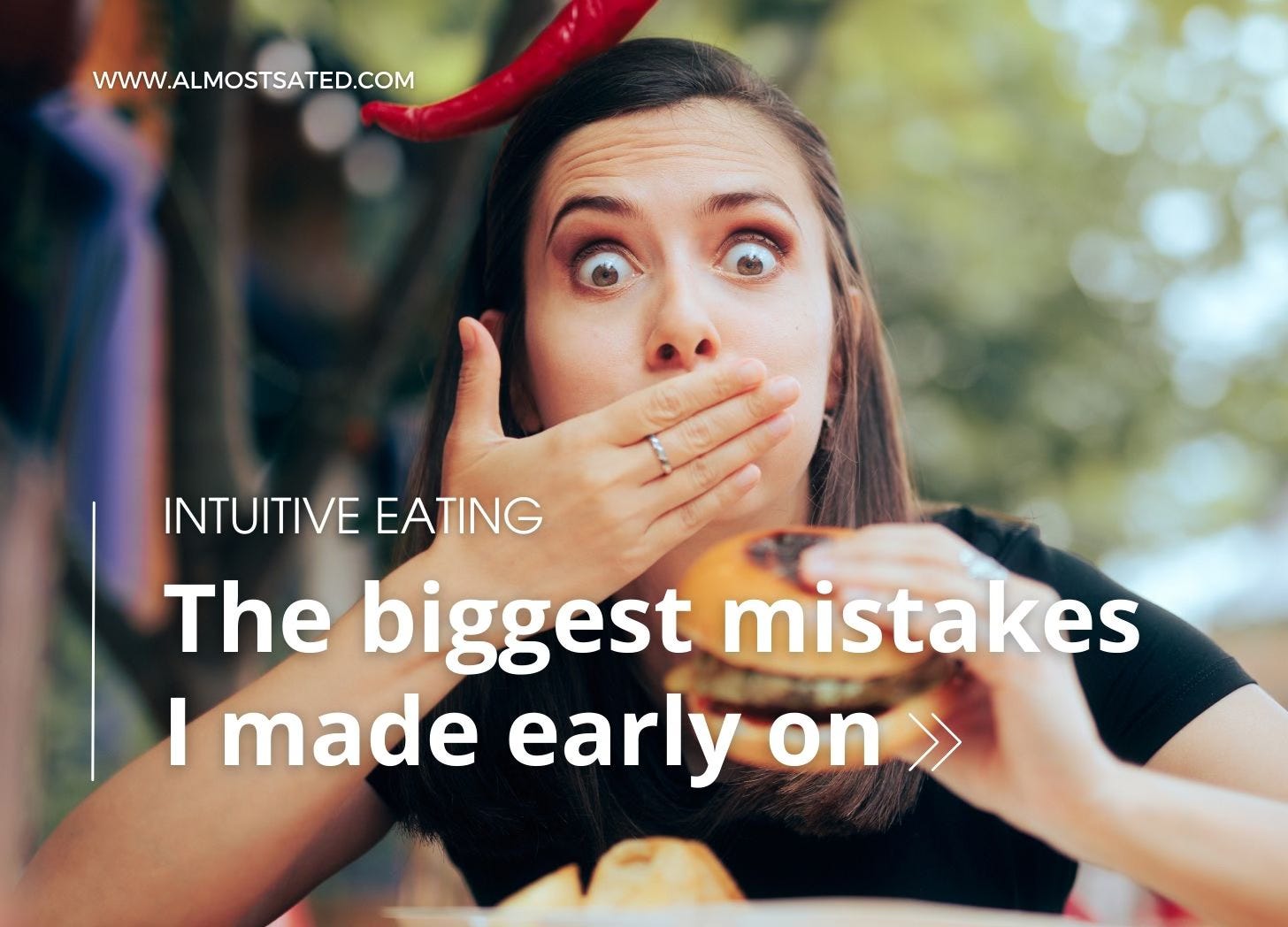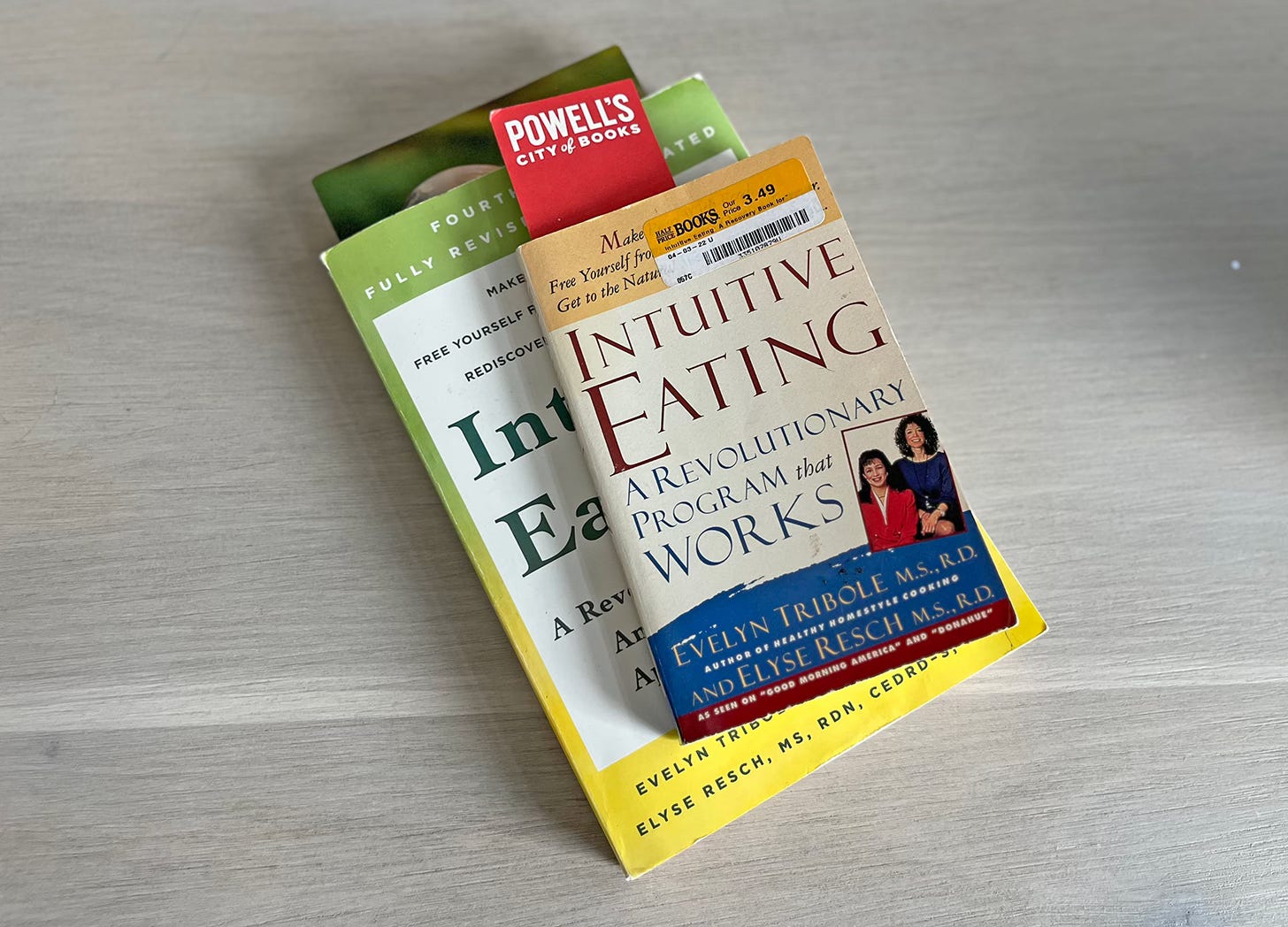Intuitive eating mistakes, I've made a few
Here are just a few of the things I did in the early days.
Hello, readers! A couple of quick announcements. I am looking for people who are interested in sharing their story of quitting diets, and no, you don’t have to be doing everything perfectly. I would love to feature you here in my series Dared to Ditch. Reach out to me at kristi.koeter (at) gmail.com and I can share more details.
Also, completely unrelated to intuitive eating or detoxing from diet culture, but I’ve started a brand-new newsletter devoted to my other passion—content marketing, SEO and branding for authors, solopreneurs and small-business owners. If you have interest in these topics, I invite you to check it out!
Now onto our regular programming…
Intuitive eating isn’t for the weak. Despite all of us being born eating intuitively, getting back to that place after a lifetime of indoctrination in diet culture thinking—that small is the only acceptable size—can be really difficult.
As I was on the plane ride to St. Lucia for my overdue honeymoon a few weeks ago, I started thinking back to my first year of intuitive eating—and all of the traps I fell into. (I know, totally romantic, right?)
There was that brief period where I tried to turn intuitive eating into a diet…forcing myself to follow the “rules” to a T, just as I had in my diet days. There were those weeks when I analyzed every bite looking for clues to my body’s satiety. It was a little like the “Can you hear me now?” Verizon wireless commercial of the early 2000s. I would check in with every morsel—am I feeling full now?—worried that going beyond fullness somehow meant failure.
I also bought into the idea that at some point, I would automatically stop wanting—and therefore eating—“bad” foods. I thought this magic internal switch would flip, and I’d never want [insert “bad” food] again. Little did I know, even when we learn which foods make our bodies feel good and which leave us empty or make us hungry faster, we still have to decide how we’re going to satisfy ourselves.
And I was obsessed with what was going to happen to my body. I wouldn’t call this a mistake, because it’s a natural response to living in our thin-obsessed world.
If I had just relied on the “Intuitive Eating” book by Elyse Resch and Evelyn Tribole, I would still be locked in some of that diet thinking. That’s not a knock on the book that started the movement nearly 30 years ago, it’s just a recognition that perhaps one book can only take us so far. Other writers helped me through some of the common pitfalls, including Caroline Dooner with her book “The F*ck It Diet: Eating Should Be Easy” and diet recovery coach Isabel Foxen Duke. The most important decision I made early on was hiring an intuitive eating-certified therapist, who helped me address trauma and reconnect with my body through EMDR, and work through the struggle of gaining weight in those early days.
I don’t believe everyone needs to hire an expert to detox from diet culture, although it can be helpful.
It’s not that intuitive eating is inherently difficult; it's the contrast with our previous lifestyles and the incessant messages promoting smallness, and equating smallness with “healthy,” that make it complex.
Nutritionist Jeanette Thompson-Wessen wrote last week that the biggest mistake she sees people making when doing intuitive eating alone is … thinking smaller. (I think this is true of most of us in the early days, whether we go it alone or hire someone to help us.) Part of what we are unlearning when we move to intuitive eating is this idea that we must be smaller, that smaller is “normal,” or our “default state,” and bigger is bad. And we’ve been brainwashed by diet culture into believing our bodies inherently cannot be trusted to provide us with accurate signals, so we must diet instead of listening to our inner wisdom, and that is small thinking.
Thompson-Wessen wrote:
“Thin ideals, beauty standards, diet culture has us always thinking small. Especially us women and AFAB. Society want us to be physically and mentally small. It has us assuming that is our default state. If we try hard enough to get back to our "default" state, we will automatically become small in all ways and conform.
So people on their own automatically assume, even subconsciously, that Intuitive eating will mean that we end up eating smaller portions with the understandable hope that weight loss will occur.”
I fell for this trap, too. When I started intuitive eating, I held onto this idea that if I stopped putting my body through this restrictive nonsense, it would naturally find its set point, and that set point would eventually be … on the thinner side. It was diet thinking. I entered intuitive eating with the idea that, yeah, I’d have a rough few months, maybe even a year, where I might gain weight, but I’d eventually settled down to the weight I was meant to be. Notice I said down and not up.
In the earliest editions of “Intuitive Eating,” that was what Elyse Resch and Evelyn Tribole were promising, too. I know, because this summer I found a 1996 edition of “Intuitive Eating” at my local Half Price Books. I suspect they moved away from this in later editions, because it’s just not true for everyone. And because to truly eat intuitively, we have to move away from our attachment to a particular body size. And this is so hard, because so many of us—generations of us—were raised to believe our body size was the only thing that mattered. Sure, it’s great that you’re intelligent or accomplished or whatever, but if you’re not thin, who cares? None of your accomplishments or positive attributes matter.
One of my big ahas while transitioning to intuitive eating and detoxing from diet culture was realizing we’re not all meant to be smaller. We’re not all meant to be thin. We humans come in a range of sizes, based on a variety of factors, most of which are outside of our control, and that is … okay.
Yes, here in America and many Western countries, we live in fatter bodies than we ever have, and we can blame our diets, the chemicals in our food, the up sizing and mass marketing of fast food, and our more sedentary lifestyles, and yes, I would be a fool to tell you none of that influences us. I think it does. When I’ve visited other countries with simpler diets and more active lifestyles, Costa Rica and St. Lucia come to mind, what I’ve seen is smaller people as a whole. But also, I’ve noticed there is still a wide range of body sizes. And if I lived in those places, I have no doubt, I would lose weight as I adapted to those lifestyle, but I would still be on the larger end of body sizes, because that is naturally where my body is meant to be.
While external factors such as diet, lifestyle, and environment influence body size, it's crucial to recognize that we naturally fall on a spectrum of different sizes. Our definition of health should encompass being the size we are meant to be naturally, even if it falls outside the average. I spent a lifetime pursuing a smaller body and basing my self-worth on this futile endeavor. Intuitive eating forced me to shed those damaging beliefs.
I don’t think thinking small is a mistake of intuitive eating. Rather, it’s the thinking we bring into intuitive eating after a lifetime of dieting. The mistake is in not letting it go.
What do you think? What were the big mistakes you made early on intuitive eating and how did you get past them? Share in comments below.






"One of my big ahas while transitioning to intuitive eating and detoxing from diet culture was realizing we’re not all meant to be smaller."
We aren't all meant to be smaller. This HAS to be true. Different genetics, different body shapes, different everything. Why would all people be healthier when they're rail thin?
Fascinating that you had help with trauma etc too to help you Kristi. Are you aware of the Adverse Childhood Experiences study? One of the things the researchers discovered was that people would diet and lose weight but put it back on again due to trauma from their childhoods.